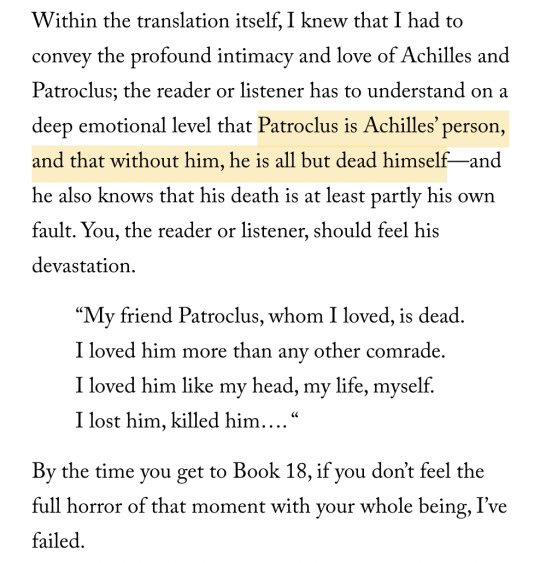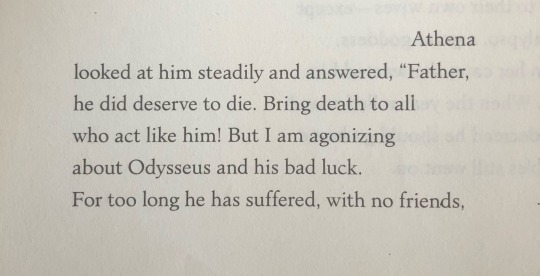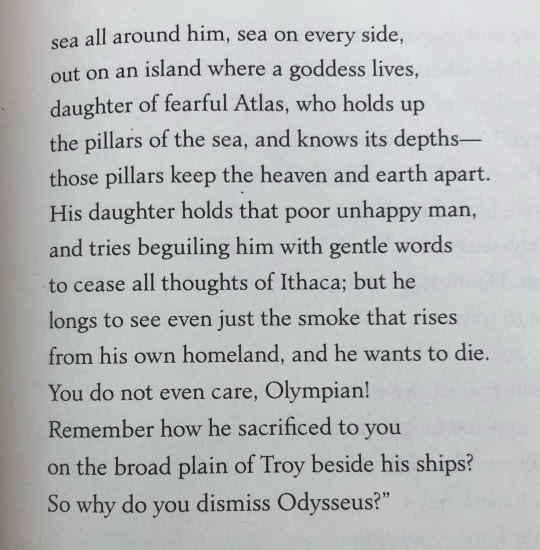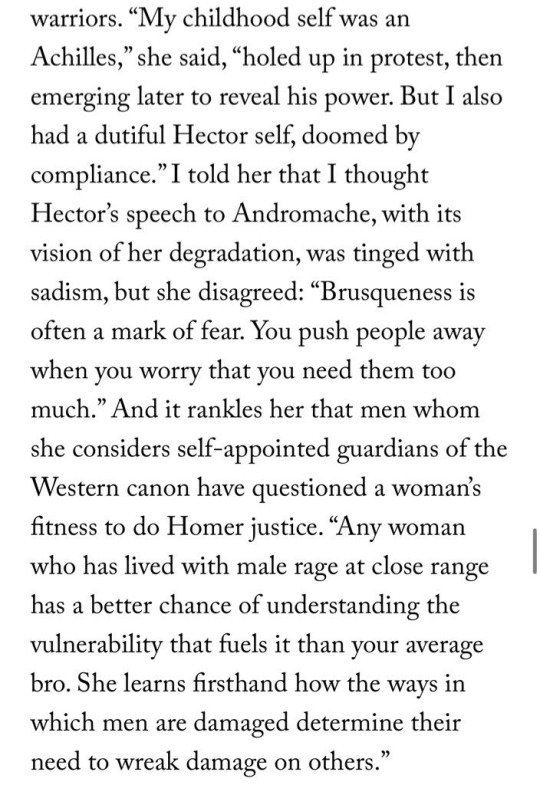#emily wilson
Text

Introduction to The Iliad, Emily Wilson
14K notes
·
View notes
Text

from the introduction to emily wilsons translation of the iliad
#the iliad#emily wilson#ancient classics#classic lit#read this over breakfast and couldnt stop thinking abt it while i was at work yesterday#achilles
27K notes
·
View notes
Text

Emily Wilson, in conversation on her translation of The Iliad with Madeline Miller (x)
#this was such a wonderful read i adored her explanation of her usage of 'dog-face' with regards to helen#excited to say ive ordered my copy and cannot wait to devour it !#the iliad#emily wilson#quotes#typography
4K notes
·
View notes
Text

emily wilson your MIND
3K notes
·
View notes
Text


Athena coming to the defence of Odysseus is very important to me.
#I don’t care how pretty and girlboss Circe and calypso were#he didn’t want them#he said no#he wanted his wife#Athena is a real one#Odysseus#the odyssey#Emily Wilson#Homer
2K notes
·
View notes
Text
"[The Iliad] avoids all the obvious highlights of the traditional story, including the Wooden Horse. It does not start at the beginning — with the Judgment of Paris, the wedding of Peleus and Thetis, the abduction of Helen, or the muster of ships at Aulis — or end with the fall of the city. Instead, the action takes place over a few days in the last year of the war — neither the beginning nor the end. A brief and ostensibly trivial episode — a squabble between two Greek commanders — becomes the subject of a monumental twenty-four-book epic.
Moreover, The Iliad eschews the obvious way for Greeks to tell the Trojan War story: as a conflict between 'us' and 'them.' The Trojans are not dishonest foreigners, despite the fact that Paris abducted his host’s wife. Implausibly, they speak the same language and worship the same gods as the Greeks.
The poem is ancient from our perspective. But it came at the end, not the beginning, of a long poetic tradition. Whoever created The Iliad used the myths, tropes, and techniques developed by many generations of oral poets, and reinvented them to create an extraordinarily original and surprising written epic."
- Emily Wilson, from the introduction to her translation of The Iliad, 2023.
2K notes
·
View notes
Text

NEW JOHN SILVER/ODYSSEUS PARALLEL DROPPED!
2K notes
·
View notes
Text

of course you have blue hair and epithets 🙄
1K notes
·
View notes
Text
"Grief is closely allied with anger. They are expressed with similar sounds: moans, groans, shouts, and screams. Like anger, grief responds to a terrible loss or terrible harm done — but without any sense of the possibility of reparation. Anger turns the pain outward, against others; grief turns it inward, to the self. People subsumed by rage try to replicate the wrongs they have suffered by hurting others. Those consumed by grief long to turn their own bodies into that of the dead loved one, by lying down in the ground, cutting the hair, scratching the face, and rolling in the dust. The enraged want to humiliate, hurt, or kill; the grief-stricken want to be dead and to inhabit the perspective of the dead.
But grief is different from anger, because it can be expressed and experienced collectively. Through the funeral rites and games for the dead Patroclus in Book 23, Achilles shares his loss with other Greek warriors, just as the Trojans in Book 24 are able to share their grief at the death of Hector. Even enemies, like Priam and Achilles, can share a moment of grief. Anger drives communities apart; grief brings them together, over a shared acknowledgment of irredeemable loss."
Emily Wilson's Introduction to The Iliad, p. xliii
954 notes
·
View notes
Text


achilles vs hector at the fall of troy, circa 1100 BC (colorized)
#achilles#hector of troy#the iliad#the odyssey#homer#emily wilson#tagamemnon#i’m in tears#they’re just kenning all over the place#let me shut up and actually finish the book now✊🏽
267 notes
·
View notes
Text
Even the smallest of words, like “even” (“per” in Greek), can create enormously consequential interpretive challenges for the translator. In Book 24 of the “Iliad,” the goddess Thetis visits her mortal son, Achilles, who is prostrate with grief for his dead friend, Patroclus. Achilles is still dragging the corpse of Patroclus’s killer, Hector, around the city walls every day, and still refusing to eat, drink or have sex — the normal activities of mortals. The goddess asks her son how long he will “devour” his heart with grief, rather than eating normal bread, and she reminds him that it is also good to have sex, or more literally (as I render it) to “join in love” — “even with a woman.”
On the most linguistically straightforward reading, the phrase suggests that his mother thinks Achilles would prefer to join with someone other than a woman — such as Patroclus, his beloved dead friend. This may be a surprise, given that earlier in “The Iliad,” the two men were described as sharing their beds with enslaved women, and they are never described by Homer as having sex with each other — although by the 5th and 4th centuries B.C., readers such as Aeschylus and Plato certainly assumed that they were lovers. Is Thetis suddenly “outing” her son? Or is she simply acknowledging the depth of his desire to be with his dead companion?
Translators sometimes leave the word out entirely (Fagles: “It’s a welcome thing to make love with a woman”) or apply the emphasis to the activity, not the partner (Lattimore: “even to lie with a woman”; Caroline Alexander, “Indeed, it is good to lie with a woman”) — although this is not a natural reading of the Greek word order. I do not think it is generally the translator’s job to correct or fight against the text; hence my decision to settle on the simple “even with a woman.” Readers can decide for themselves whether Achilles is yearning to “join” Patroclus in a sexual sense or to mingle with his dear ashes in the tomb.
- Emily Wilson on 5 crucial decisions she made in her ‘Iliad’ translation (link goes to the archive.ph version of the original washington post article due to its paywall)
1K notes
·
View notes
Text
....the Iliad doesn’t have anything explicit, or even implicit, about our heroes having sex. Patroclus and Achilles sleep in the same tent, but the narrator tells us that each of the men has an enslaved woman at his side. I felt I had to respond to the reader’s possible expectations and possible disappointment in two ways. One was to discuss the Patrochilles relationship fairly extensively in the introduction and notes, and make clear the ways that it’s taken absolutely seriously, and is at the emotional heart of Achilles’ narrative arc. In the introduction, I also discuss the fact that the Iliad doesn’t treat sex as a measure of closeness or love—so the fact that the poem doesn’t tell us that Achilles and Patroclus had sex is in no way a sign that they’re less than everything to each other. The characters who do have sex in the Iliad—Helen and Paris, Hera and Zeus, and various warriors with the enslaved women whom they regularly rape—are not exactly doing so out of “love.”
Within the translation itself, I knew that I had to convey the profound intimacy and love of Achilles and Patroclus; the reader or listener has to understand on a deep emotional level that Patroclus is Achilles’ person, and that without him, he is all but dead himself—and he also knows that his death is at least partly his own fault. You, the reader or listener, should feel his devastation.
“My friend Patroclus, whom I loved, is dead.
I loved him more than any other comrade.
I loved him like my head, my life, myself.
I lost him, killed him…. “
By the time you get to Book 18, if you don’t feel the full horror of that moment with your whole being, I’ve failed.
Excerpt from Enduring Epics: Emily Wilson and Madeline Miller on Breathing New Life Into Ancient Classics on Literary Hub
#patrochilles#the iliad#homer's iliad#emily wilson#tearing up during my break at work how's everyone doing#SO READY for this translation you don’t even know omg#also my two favourite classicists/authors in the same interview what a treat#ALSO the fact that Wilson unironically uses the term 'patrochilles' ashdndhs I am LIVING
689 notes
·
View notes
Text

can’t stop thinking about this excerpt from an interview with emily wilson (x)
#need to preorder her iliad immediately!!!#this interview was such a wonderful read my goodness#emily wilson#words#quotes#typography#on life#on womanhood
540 notes
·
View notes
Text

oddyseus. girlieboy. oogie boogie. what the fuck is wrong with your thought process.
#HOW DOES IT LEAD TO THIS 💀💀💀 JAHSDIUKESGUGBFOEIWDKS SCREAMING RN#odysseus#the odyssey#laertes#emily wilson#(its her translation ofc)#the iliad
841 notes
·
View notes
Text

Ok my dudes, place your bets…
#I can’t decide dammit#Iliad#Emily Wilson#tagamemnon#greek mythology#greek myth#homer#the iliad#translation#audiobook#greek myth retellings
449 notes
·
View notes
